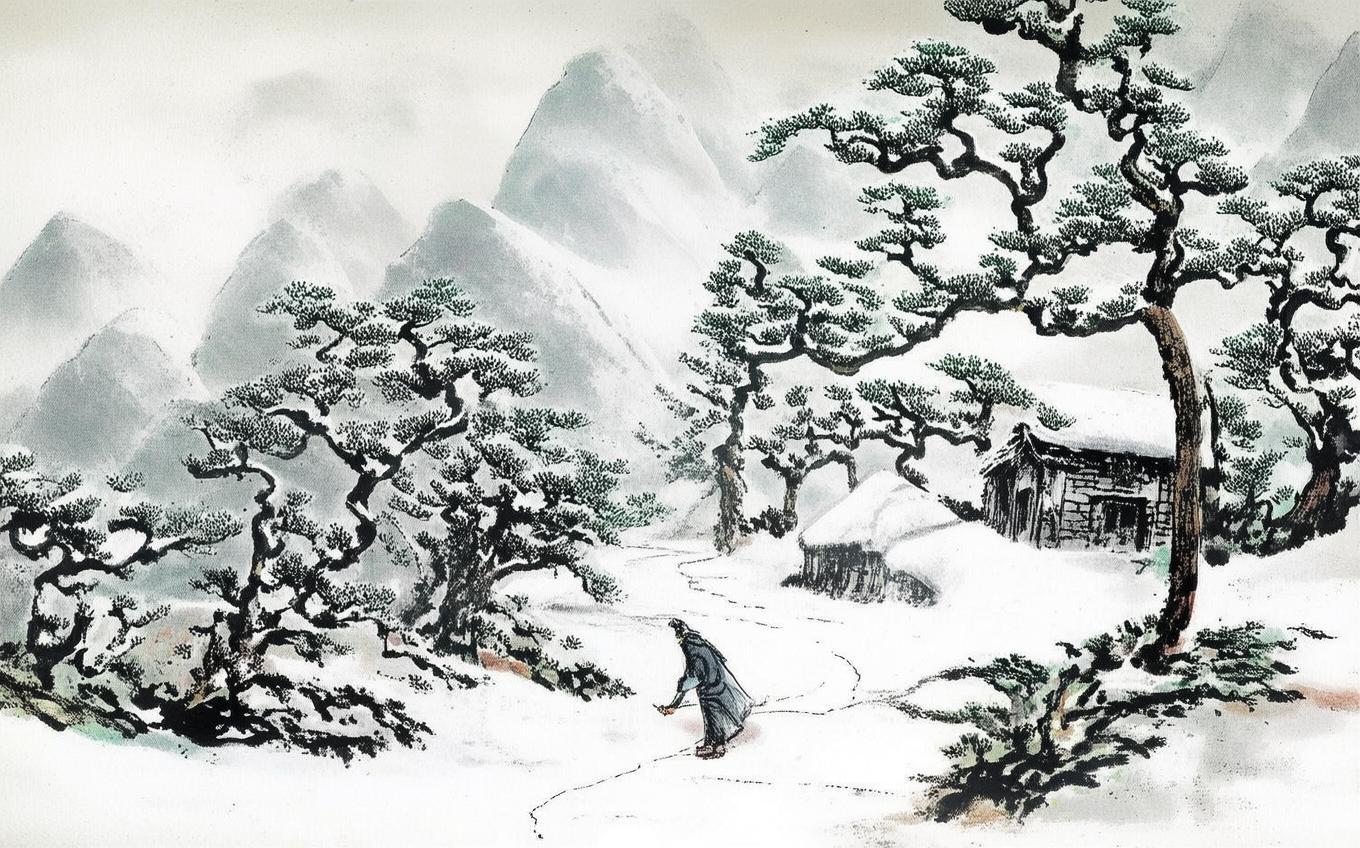Analysis of "逢雪宿芙蓉山主人" - Classical Chinese Poetry
Introduction
The poem "逢雪宿芙蓉山主人" (Féng Xuě Sù Fúróng Shān Zhǔrén) was written by Liu Changqing (刘长卿), a prominent poet of the Tang Dynasty (618-907 AD). Known for his refined and melancholic style, Liu often depicted scenes of nature intertwined with human emotions. This particular poem is celebrated for its simplicity and profound atmosphere, capturing a moment of quiet encounter during a snowstorm. It reflects the Tang Dynasty's aesthetic values of subtlety and emotional depth in poetry.
The Poem: Full Text and Translation
日暮苍山远
Rì mù cāng shān yuǎn
At dusk, the blue mountains appear distant天寒白屋贫
Tiān hán bái wū pín
In the cold weather, a thatched cottage looks poor柴门闻犬吠
Chái mén wén quǎn fèi
At the wooden gate, a dog's bark is heard风雪夜归人
Fēng xuě yè guī rén
Through wind and snow, someone returns at night
Line-by-Line Analysis
-
"日暮苍山远" (At dusk, the blue mountains appear distant)
- The opening line sets a tranquil yet melancholic scene. The "dusk" symbolizes the end of a journey, while "distant blue mountains" evoke a sense of solitude and vastness. -
"天寒白屋贫" (In the cold weather, a thatched cottage looks poor)
- The "white cottage" (白屋) refers to a humble dwelling, emphasizing simplicity and poverty. The cold weather enhances the feeling of hardship, yet there is warmth in the shelter it provides. -
"柴门闻犬吠" (At the wooden gate, a dog's bark is heard)
- The sudden sound of a dog breaks the silence, introducing life into the desolate scene. The "wooden gate" (柴门) suggests a rustic, rural setting. -
"风雪夜归人" (Through wind and snow, someone returns at night)
- The final line reveals the arrival of a traveler, braving the harsh weather. The phrase "夜归人" (night returnee) conveys a sense of perseverance and the comfort of homecoming.
Themes and Symbolism
- Nature and Solitude: The poem contrasts the vast, cold landscape with the small, warm cottage, highlighting human resilience against nature’s harshness.
- Homecoming and Hospitality: The dog’s bark and the returning traveler suggest themes of reunion and the kindness of strangers, a valued virtue in Chinese culture.
- Simplicity and Poverty: The "white cottage" symbolizes humility and contentment, reflecting Daoist and Confucian ideals of modest living.
Cultural Context
During the Tang Dynasty, poetry was a medium for expressing personal emotions and philosophical reflections. Liu Changqing, exiled late in life, often wrote about loneliness and fleeting moments of human connection. This poem exemplifies the Tang aesthetic of yijing (意境), where a simple scene conveys deep emotional resonance. The imagery of snow and mountains was commonly used to represent life’s challenges and the beauty of perseverance.
Conclusion
"逢雪宿芙蓉山主人" is a masterpiece of brevity and depth, capturing a fleeting yet profound moment in nature. Its enduring appeal lies in its universal themes of solitude, warmth, and the quiet beauty of human connection. Even today, the poem resonates as a reminder of the solace found in simple shelters—both physical and emotional—amid life’s storms.




Comments (0)
No comments yet. Be the first to comment!